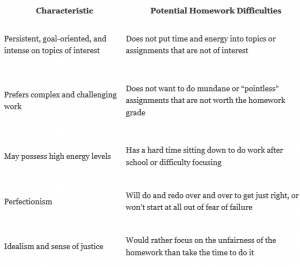This year, many parents have reached out to me to help their child with time management. A few have been concerned that their gifted child is on the road to underachievement, not being straight forward about their homework and building a steady list of zeros in the gradebook. On the other hand, some parents are worried that their gifted child is taking too much time on assignments and creating unnecessary stress for everyone in their home. These are both extremes in the time management pendulum and while very different, they are equally frustrating as a parent.
There are probably some of you reading this that do not have either of these issues with your gifted child and they magically get all their work done in reasonable timeframes- what a blessing! Giftedness is a spectrum of many traits, both wonderful and maddening. We can’t compare our children’s struggles with their siblings, friends, peers, or anyone else. One of my favorite quotes is from Eleanor Roosevelt, “Comparison is the thief of joy.” You have not failed as a parent if your child isn’t doing their homework and your neighbor’s kid is.
Truthfully, if time management is an issue for your child, you are not alone! We live in a crazy, busy world where we start our days intending to do it all and end our days feeling like a tornado picked us up sometime after our morning coffee- then dumping us out at bedtime feeling frazzled and unaccomplished. With a mixture of work, school, sports, theater, clubs, church, appointments, therapy, or whatever combination of activities that your family navigates through weekly, time tends to slip through our fingers. It is no wonder that our gifted kids struggle with time management.
Even without busy schedules, the gifted brain is naturally susceptible to problems with homework which have nothing to do with their ability to do the work. For example, look at some common gifted characteristics and potential difficulties below:
These, and many more characteristics make it hard for our gifted kids to be motivated to get their homework done. Unfortunately, telling teachers that you are too busy or unmotivated will not benefit our kids. So- it may be time to try out some time management strategies.
The first thing that you need to know is that developing new strategies and habits takes support. So, my tips to help your child with time management will require your involvement, especially if they have a history of struggling with executive functioning. In which case, each step should be taught slowly with direct instruction. I have created a basic printable PDF (Time-Management-Graphic-Organizer) that you can use to plan out homework time, or you can use any of the tips below independently.
These strategies may not be the answer you are looking for, but hopefully they give you a place to start.
1. Have your child make a list of everything that needs to be done. Go subject by subject and include both daily requirements (e.g. nightly reading) and long-term projects (e.g. science/history fair). If they have no clue of what they need to do or what they are missing, look in HAC for zeros, on Schoology (middle/high), teacher emails/newsletters, email the teacher, or have them call/text a classmate. There are MANY ways to find out- don’t let them fool you into thinking the information is unattainable.
2. Go through the list of assignments together and estimate how long each should take. This is tricky to do at first, but after a few attempts your child should know how long it really takes to write a few decent paragraphs. The best way to get a good idea is to estimate and then time how long each task actually takes. Did it really take an hour to do that project or was it more like 30 minutes? Did you spend 2 hours on something that should have been 20 minutes? Why? This will give you and your child an idea of how much time is wasted or how much longer you needed than you thought.
3. Prioritize the assignments: What is due tomorrow? What is due next week? Do you want to start with easiest or hardest? Do you want to start with shortest or longest time commitment?
4. Add up the entire time commitments. For example: Math HW- 30 min + Study for Science test- 30 min + Rough Draft of Essay- 45 min = 1 Hour and 45 minutes estimated of HW.
5. Consider your child’s extracurriculars for the day. For example: If your child gets home from school at 3:30, goes to soccer practice from 5:30-7, and has bedtime at 9. The only timeframes to get homework done is between 3:30 and 5:15 or 7:15- 8:45.
6. Calculate how much free time your child gets when you subtract extracurriculars and homework. Is it worth wasting that time fighting over doing it? They might even see that they get WAY more free time than homework time. This is especially good for kids who feel like their homework takes up all their time (hence the injustices of it all).
7. Rethink overcommitting your child, even if they beg for it. Gifted kids tend to have many interests and want to pursue all of them. When you look over the estimated homework and the allotted time, make sure there is still free time. Whether they know it or not, a little wiggle room to do nothing is good for kids. This may also alleviate scheduling stress on you.
Yes, this is a lot. Yes, it is frustrating at first. No, it is not guaranteed to work. However, it will give you a good grasp on your child’s time budget and how to help them use it wisely. If you are at your wit’s end with your child’s time management and read this whole post in an act of desperation- please give it a shot. Let me know how it goes or if you have any tips of your own to share!
ERIN ARNOLD



